

Old Kingdom, Dynasty IV; 2551-2472 BCE
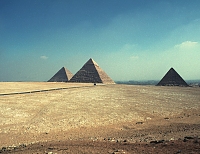
|
These three pyramids, built in about a 75 year period, exhibit the engineering and bureaucratic skills of the early Egyptians. Huge limestone blocks were brought from quarries on the east side of the Nile to be placed in tiered courses in structures so immense that they were classed as wonders of the world; vast numbers of workers and numerous man hours were required for their erection. Not only had Egyptians mastered stone masonry but they had astronomical knowledge as well--how much is debated. Still, the pyramids are oriented to the cardinal points of the compass. | |
The pyramid of Khufu, c. 2520-2494The oldest and the largest, this so-called "great" pyramid was originally about 480 feet high and is 775 feet at the base on one side. |
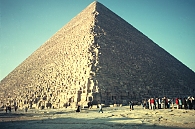
|

|
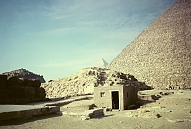
|
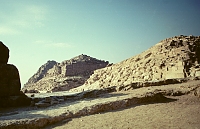
|
In addition to Bedouins on camels (see above), the immediate environs have both pyramids and mastaba tombs of the nobility. |
A small pyramid of the nobility and the hieroglyphic inscription of Idu's tomb |
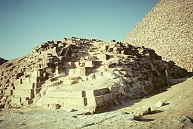
|
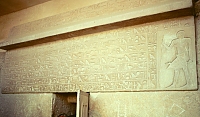
|
The pyramid of Khafre, c. 2520-2494Just south of Khufu's pyramid, this one seems larger since it is on higher ground. It is actually 10 feet shorter and 48 feet narrower at the base. Of the three, it is the only pyramid which still has the casing stone of pearly white limestone on it peak; most of this stone was stripped from the pyramids to build Cairo. | ||
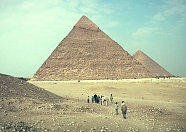
|
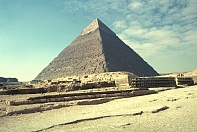
|

|
The "walls" and details of the stone coursesThe pyramid of Khafre was actually hewn into the bedrock; the "walls" on the side actually show how deeply cut the pyramid was. See also Khafre's valley temple. | ||
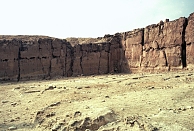
|
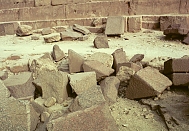
|
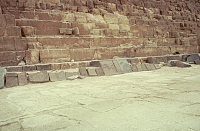
|
The pyramid of Menkaure and Mortuary Temple, c. 2490-2472The smallest of the pyramids, Menkaure's is 218 feet high (about a 15-story building) and about 356 feet at the base. |
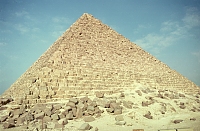
|
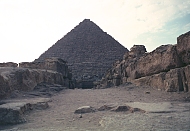
|
 Click here to go to the Egypt Index.
Click here to go to the Egypt Index.
 Click here to return to index of art historical sites.
Click here to return to index of art historical sites.
 Click here to return to index of artists and architects.
Click here to return to index of artists and architects.
 Click here to return to chronological index.
Click here to return to chronological index.
